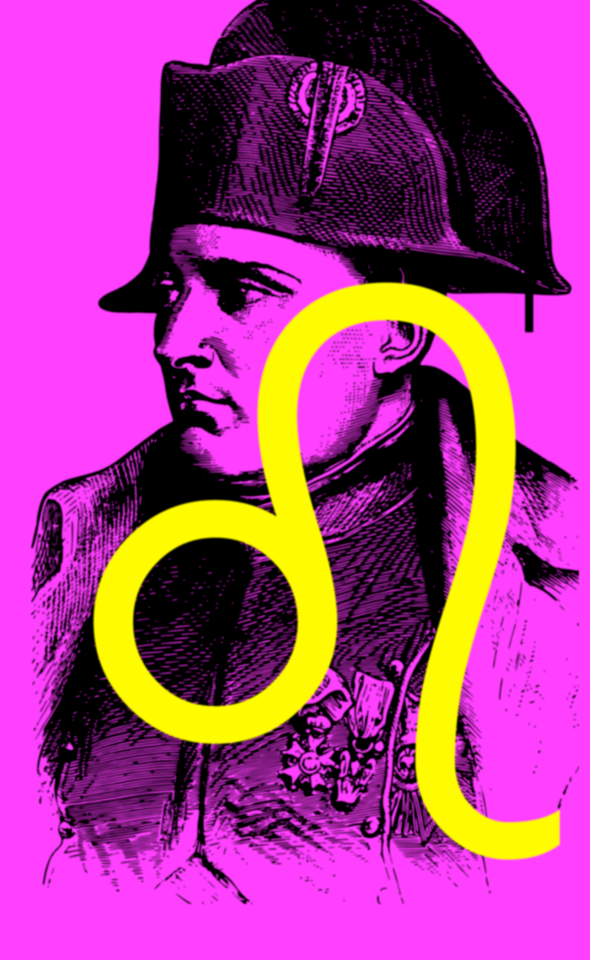
Leos. If there were one single person in history who embodies what it means to be a Leo, it would be Napoleon (Bonaparte, France’s first emperor, that famously tiny and domineering little bossman who gave us such gems as “If you want something done well, do it yourself,” “Stupidity is no handicap in politics,” and “He who fears being conquered is sure of defeat,” as well as the title of this article, which was how the Emperor defined history). And if there is any one sign for whom this remarkable consistency of bravado, of charisma, of brilliance, and of sheer bloody-minded stubbornness is evinced, it’s Leo. In the words of my perspicacious fellow Libra Ani Difranco, “Every one is a fuckin’ Napoleon.”
The thing about Leo? They’re not even offended I just said that. They think Napoleon was a badass. I was in London last summer at this rooftop bar called Bar Elba (natch) near Waterloo Station (natch) and as I was waiting in line for some beers and cheese fries (which turned out to be limp potato sticks covered with a greyish, British version of Velveeta because, let’s face it, no one does shite food shiteier than the English), the Leo barman said laughingly to me, “I may be imprisoned here, but I’ve got a brilliant view.” And he gave me a free beer. And I ate every one of those soggy glue stix, even though objectively they were lackluster at best. Because, you know, Leo. They can make you believe.

For example: Bill Clinton is a Leo. Mick Jagger is a Leo. Halle Berry is a Leo. Amelia Earhart was a Leo. Annie Oakley was a Leo. Chuck D is a Leo. James Baldwin was a Leo. Dua Lipa is a Leo. Bitch, Madonna is a Leo. Obviously. That should be enough for anyone to understand that this fixed fire sign is like a blowtorch that’s always on. (Leo is reading this and lapping it up. You’re not wrong, Leo. You are always the queen.)
I admire Leo. When those of us who are fainter of heart try to be judicious and fair or measured and balanced, Leo goes big. When those of us whose ego is not a burning sun back down or back off, Leo dives deep, possibly wearing spangles or tin foil or underwear made entirely out of lit sparklers or those birthday candles that relight when you try to blow them out.
Of course, when Leos are wrong, they’re grandly, dramatically wrong, but they usually somehow manage to right the ship and reverse course without being accused of flip-flopping. When Sag does it, it’s flip-flopping — sorry, John Kerry, this is why you never won a national election — but when Leo does it, it’s Seeing the Light, and they somehow manage to make the rest of us see that light right along with them. If Taurus is the disapproving old-school Lutheran minister of the zodiac, Leo is the revivalist preacher, and singing Hallelujah along with them is enough to fill anyone with endorphins.
Many of us spend our lives searching for a valiant champion on a white horse (Oh Libra! Oh Pisces! You so misguided). Leo is its own champion, and it works for them. Leo doesn’t think this is self-aggrandizing or egomaniacal or narcissistic — and, in fact, Leo is the master of being self-interested without being selfish, of being self-loving without narcissistic. Some signs can’t do this at all; the nuance is lost on them, and they’re either hopelessly self-sacrificing, desperately passive-aggressive, or pathologically selfish (I’m looking at you, Virgo, Cancer, Taurus). Leo has no time for this and can’t imagine why you would want to. For Leo, it’s basic math. As Madge says, “A lot of people are afraid to say what they want. That’s why they don’t get what they want.”
Being afraid to say what they want is not Leo’s problem, and bless them for it. Maybe if the rest of us were less lily-livered and codependent we could just prance through life with that kind of sunny independence, refusing to take on others’ pathologies or baggage, embodying the groovy sass of Leo: “I’m not your b****; don’t hang your sh** on me,” as Madonna croons in “Human Nature.” Maybe we would figure out how to say what we want, or understand that it’s a never the zero sum game we fear. Maybe if we figured out how to get what we want without snatching it from the next kid at the table we’d be able to go forth boldly, like Leo. Maybe we’d spend less time feeling resentful (Cap!) or suspicious (Scorpio!) and more time admiring our own daring.

Tiana Clark’s I Can’t Talk about the Trees without the Blood is such a deep and fearless dive, a headlong run into the problematics of color and race in America, but more, into the weight of history and the meaning of blackness. From the epigraph, a line from Roger Reeves’s poem “Boy Removing Fleas” (itself after a painting by Jean-Michel Basquiat), the book situates itself in a tradition of Black American art, explicates itself into a tradition of Black American grief because, of course, you cannot hear of trees without thinking of “Strange Fruit,” and if you wondered if that was too much of an extrapolation — please. Refer to the second line of the song, “Blood on the leaves and blood at the root…”

I can’t talk about the trees without the blood. No, I can’t. No indeed. This is the genius of Leo: it doesn’t just drop into whatever frame some previous paradigm left lying around. It knows how to draw the frame. Rather than try to meet you on the expected ground, Leo picks their own ground, invites you on to it, and makes it hard to imagine anything else working. So does this book, immediately, delineate its own borders, Clark making clear the ground she is writing to/from.
The collection opens with a prologue, Nashville — locus of the speaker’s family history, locus of gentrification, appropriation, the openness of race-based hatred that still exists there, the fear of miscegenation so clearly expressed, resulting in the hurling of slurs at the speaker and her white husband, resulting in a couple’s common home/region/heritage being as deeply sundered as they can be, resulting in “four violent syllables stabbing my skin, enamored with pain,” and the speaker’s self-admonition to “watch your back,” resulting in the panicked susurrations of a limbic system that knows itself to be threatened, “Who said it? / Who said it? / Who said it?”
It’s a masterful gesture to begin a masterful book, this frenzied echo of fear that those of us who have been targets know.
The book is divided into sections, each a segment of the title, beginning with the impossibility of speech, beginning with breath, beginning with crushed teeth and dark orifices, as in the epic “Cottonmouth,” which crescendos into the deep, unnatural unhinging of a snake jaw, of birth, of the gruesomeness of nature: “Am I being eaten, or eating? Who can say, really?” Clark’s lyrics are unapologetic, a commitment to bear witness (that phrase the title of one of the poems in this section), but more, they are an audacious and playful engagement with the history of a people too often swept under rugs or out kitchen doors, and Clark’s holding this history as presence somehow enfleshes it for the reader, and not without some gorgeous side-eye to John Berryman’s Dream Songs and their hapless blackface: “I bite John Berryman’s tail /And Henry runs out of his mouth.” Be warned, reader: Clark’s speaker is nobody’s fool, and she is not unarmed: “I’ve got two fangs / in my mouth / that could pierce you.”
If Berryman gets three lines, Phyllis Wheatley gets pages and pages, in a series of letters, some from Clark’s speaker (“We were good at hiding our zip code and teeth”) one from Wheatley’s real-life friend, Obour Tanner, intense, evocative, pungent with memory of the slave ships, plangent with longing nad grief: “Remember inky black, starless black, / blue-black with moaning, smelled like salt and salvation: God’s skin hammered / with long nails like our breath, bleeding.”
The latter portions of this section document more contemporary stories: the speaker’s own assaults, which seem of a piece with this river of history we’re floating down; the recent tragedies of Kalief Browder and Trayvon Martin, and here again Clark holds up history’s dingy pages to the light, bears pitiless witness to all of our wrongs, and refuses to let us out, confronting, like Leo, all the ugliness of the world with head held high: “& I’m emptying / a waterfall shouting / KALIEF” the poem echoes, and finishes, solemn and final: “the ground is swollen with your name.”
The second section, “About the Trees,” with an epigraph from Adrienne Rich warning, “it’s necessary to talk about trees,” is all gesture: three balletic pieces beautiful in their airiness and the Coleridge-inspired “The Rime of Nina Simone,” in which the chanteuse appears as judge and oracle, as coach to Clark’s speaking self, speaking truth, describing the structure of that scaffolding upon which a race has been hung without justice or decency. “You have to stay mad / your whole damn life,” the poem admonishes. “You have to make / love / to the damage / in your mind — ”
Yes, lionheart. Don’t put the damage aside. Don’t just acknowledge it. Make love to it. Make it your Adonis and your art. Perform it like those ballets. Make people see. Make them clasp it to their breasts. Be, like the Gwendolyn Brooks that introduces our Epilogue, “the last of the loud. Nevertheless, live.”
Happy birthday, Leo. Stay fearless. Stay, as Clark writes, “like a god…hell-bent on carving beauty…from sacrifice.” Stay ready to question all agree-upon lies, to make history over in your more just and beautiful vision.
Real Chaos Astrology, vol. 8: A Set of Lies Agreed Upon was originally published in Anomaly on Medium, where people are continuing the conversation by highlighting and responding to this story.
